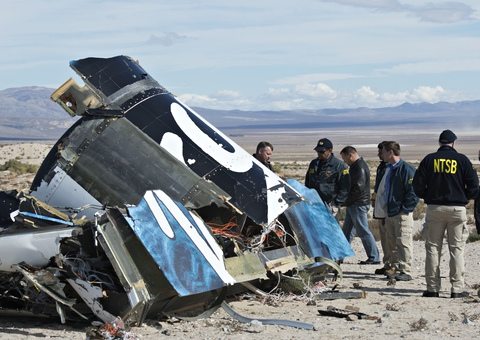Thinking, maybe, that it brings some purifying wonder to the pointless exercise, space plutocrats like to emphasise that their wish as grown men to ride in a space rocket dates from more innocent times. “Ever since I was five years old I’ve dreamed of travelling to space,” Jeff Bezos says. Specifically to ride upwards for roughly as far as Huntingdon is from London, float for a few minutes, then come back again? It only increases your respect for the tots who settle for Disneyland.
Beating Amazon’s founder to it last week, Richard Branson also aimed to bring to his somewhat shorter (turn back at Newport Pagnell) Virgin stunt, a flavour of Le Petit Prince. “I was once a child with a dream, looking up at the stars,” the author of Screw It, Let’s Do It offered as the origin myth behind a video of him bobbing about in his space suit. It may be an incongruous thought for anyone who has come, after a lifetime’s exposure, to understand Branson’s dream as primarily that of making money and hoisting nearby women into the air. But fair enough, he was probably innocent once, even if it doesn’t, like any early interest in the stars, come across in his autobiography, Losing My Virginity.
At the time of the moon landings, the teenage entrepreneur was already living in a commune, where “there was lots of talk about free love, and lots of practice of it”. One of Branson’s guiding principles, stressed in Screw It, is that “sex appeal” is good for a brand. “Definitely, sexy is very cool. I want Virgin to be the coolest brand on the planet and for that, I’m prepared to dangle in the buff over Times Square, fly over Everest in a balloon, or find myself on a bunjee [sic] 100 feet below a helicopter in a skydiver position, to be landed among 100 buxom and beautiful female lifeguards…”
Or, as last week, to go almost into space then pose with a female crew member, Sirisha Bandla, sitting on his shoulders. Whether this shift towards a more dignified woman-carrying technique signals, along with his inspirational address, the mature Branson’s wish to distinguish his mystical space tourism experience from previous jaunts, or just some vague awareness that #MeToo complicates things, it certainly seems to have lacked the PR impact of earlier iterations featuring, say, Dita von Teese or an upside down Pamela Anderson (“The photographers couldn’t keep their eyes off her nature-defying breasts that flipped right out”). Though even if he had, as in the old days, hired a portable woman in a red outfit for the occasion, some grudging press accounts of his expedition, with some yet more disrespectful tweets, have contributed to the impression that if we are not yet entering a post-Branson age, this ubiquitous figure, unavoidable at least since he gave Margaret Thatcher a boat ride up the Thames (“her profile cut through the wind like a bowsprit, and not a single strand of hair had blown out of place”), may finally be becoming his own, declining asset.
Supposing anyone ever wanted to look at Branson kitesurfing with a naked woman on his back (“I only wish I had eyes in the back of my head”), it is hard to believe such an image could now – excepting, no doubt, in some likeminded sections of the space tourism market – achieve much beyond widespread nausea. Which must represent progress, of a sort, since he bundled Kate Moss around the wing of a Boeing 747. Whatever a less offensive Branson could mean for humanity, it obviously presents marketing challenges for Virgin as a company, assuming they’ve been studying online commentary on their mascot.
For if Branson’s rocket performance represented, as well as a ticket promotion, a stab at corrective profundity, this improved messaging still only seems to have reminded people who may have missed him dressing up as a Zulu warrior or as Che Guevara or – quite a favourite with him – a woman, of his other, arguably still more disquieting habits, from paying no personal income tax in the UK since he moved to the tax-free British Virgin Islands (BVA), to, in connection with Virgin Care, suing the NHS. It has evidently not reached parts of Twitter that Branson lives in the BVA purely, he explains, for health reasons. Nor does Branson’s well-advertised closeness, along with Thatcher, to Nelson Mandela and Princess Diana now placate internet critics reminded by the rocket trip that this amateur statesman recently sought a UK state subsidy when the pandemic grounded Virgin planes and last week took off from a base built with the help of $220m from earthbound US taxpayers.
Until Bezos gets in his rocket this week, then Elon Musk’s crew in his, it’s hard to distinguish how much of the negative or unimpressed public responses to such ascents is Bransonphobic, how much a verdict on space exploration and how much a growing suspicion of men who, with the colossal means to address climate disaster, would rather burn their wealth on projects that even they occasionally admit are juvenile. There may, perhaps, be something peculiarly irritating, for anyone aware of Branson’s personal and commercial contribution to airline emissions, to see him bloviating about the “beautiful Earth” he wants customers to look at, on their £180,000 rides, so they subsequently “work very hard to try to do magic to it to look after it”. As for Virgin Galactic, it has hopes of a supersonic travel business.
Whatever it does for – or to – space exploration, Branson’s latest outing does appear, beyond any of his previous exploits, genuinely to have advanced public understanding of his own public-relations strategy, one that served him so well in an era more hospitable to women-jugglers, before Bezos and Musk got going. “Anything,” he wrote in 2006, “however outlandish, that generates media coverage reinforces my image as a risk-taker who challenges the establishment.” If Branson has inadvertently torched this signature principle then, yes, something good did come out of that rocket.
• Catherine Bennett is an Observer columnist











